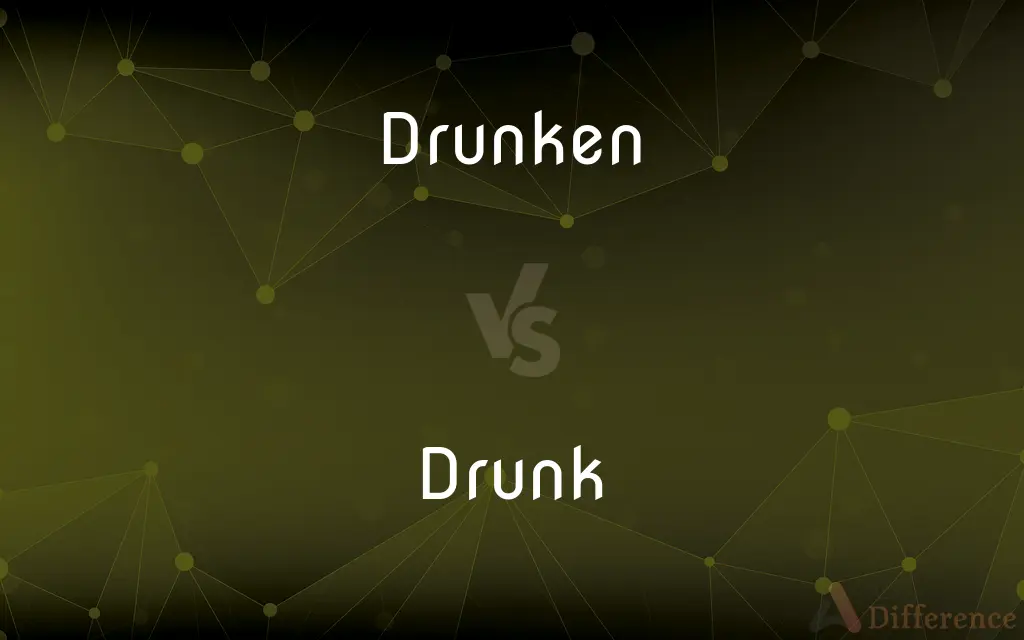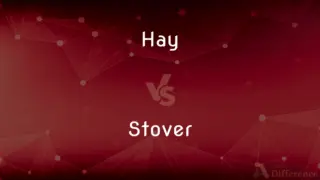Drunken vs. Drunk — What's the Difference?
By Urooj Arif & Fiza Rafique — Updated on March 27, 2024
"Drunken" is an adjective describing someone habitually intoxicated or something related to or caused by intoxication. "Drunk" primarily serves as the past participle of "drink" and an adjective describing a state of intoxication at a specific moment.

Difference Between Drunken and Drunk
Table of Contents
ADVERTISEMENT
Key Differences
"Drunken" and "drunk" both relate to the effects of consuming alcohol but are used in slightly different contexts. "Drunken" characterizes a habitual state or behavior, often implying a pattern or characteristic related to alcohol consumption. For instance, "drunken behavior" suggests actions habitually influenced by alcohol. On the other hand, "drunk" is used to describe the temporary state of being under the influence of alcohol. Saying someone "is drunk" refers to their current condition, without implying a habitual pattern.
In terms of usage, "drunken" is often employed to modify nouns, describing things or behaviors associated with or resulting from intoxication, such as "a drunken brawl" or "drunken driving." It characterizes the nature of something as being influenced by or full of alcohol. "Drunk," however, describes the temporary condition of someone who has consumed alcohol and is experiencing its effects, as in "He got drunk at the party."
While "drunken" can carry a more negative connotation, suggesting reckless or habitual intoxication, "drunk" is more neutral, simply stating a fact about someone's condition without necessarily implying judgment about their character or habits. However, "drunk" can also function as a noun, referring to a person who is intoxicated or, informally, to individuals who habitually consume alcohol to excess.
Both terms reflect societal attitudes toward alcohol consumption, with "drunken" often used in contexts that emphasize the negative consequences or moral judgments associated with excessive drinking, while "drunk" focuses more on the state of intoxication itself, whether it's seen in a negative, neutral, or even humorous light.
In summary, the distinction between "drunken" and "drunk" lies in their usage and connotations, with "drunken" focusing on habitual intoxication and its associated behaviors or characteristics, and "drunk" describing a state of being under the influence of alcohol at a particular time.
ADVERTISEMENT
Comparison Chart
Definition
Adjective describing habitual intoxication or things related to intoxication.
Adjective or past participle of "drink," describing a state of intoxication.
Usage
Modifies nouns to describe behaviors or things associated with alcohol.
Describes a temporary condition of being under the influence of alcohol.
Connotation
Often negative, implying recklessness or habitual intoxication.
Neutral to negative, focusing on the current state without implying habit.
Examples
"Drunken brawl," "drunken driving."
"He got drunk," "They were drunk at the party."
Noun Form
Not commonly used as a noun.
Can also refer to a person who is intoxicated or habitually drinks too much.
Compare with Definitions
Drunken
Characterizing habitual intoxication.
Drunken antics often lead to trouble.
Drunk
The past participle of "drink" used in various tenses.
They had drunk too much the night before.
Drunken
Relating to actions or behaviors influenced by alcohol.
The party was ruined by a drunken fight.
Drunk
Temporarily under the influence of alcohol.
She was drunk after just two glasses of wine.
Drunken
Used to describe things associated with excessive alcohol use.
Drunken driving is a serious offense.
Drunk
Describing a state of intoxication.
He realized he was too drunk to drive.
Drunken
Pertaining to the habitual aspect of alcohol abuse.
Drunken behavior is a sign of deeper issues.
Drunk
Informally, a person who is intoxicated.
A drunk stumbled out of the bar.
Drunken
Implying a lack of control due to alcohol.
His drunken state was evident to everyone.
Drunk
Also referring to habitual drinkers.
He's a drunk, avoiding responsibility.
Drunken
Delirious with or as if with strong drink; intoxicated.
Drunk
Past participle of drink.
Drunken
Habitually drunk.
Drunk
Intoxicated with alcoholic liquor to the point of impairment of physical and mental faculties.
Drunken
Of, involving, or occurring during intoxication
A drunken brawl. See Usage Note at drunk.
Drunk
Caused or influenced by intoxication.
Drunken
Cooked with wine or another alcoholic beverage
Drunken mushrooms.
Drunk
Overcome by strong feeling or emotion
Drunk with power.
Drunken
Inflection of drink
Drunk
A drunkard.
Drunken
(ambitransitive) To make or become drunk or drunken; intoxicate
Drunk
A bout of drinking.
Drunken
Drunk, in the state of intoxication after having drunk an alcoholic beverage.
Drunk
As a result of excessive alcohol consumption, usually by drinking alcoholic beverages.
Drunken
Given to habitual excessive use of alcohol.
Drunk
Or frequently in a state of intoxication.
Drunken
Characterized by or resulting from drunkenness.
A drunken display of crude exuberance
Drunk
(usually followed by with or on) elated or emboldened.
Drunk with power, he immediately ordered a management reshuffle.
Drunken
(obsolete) Saturated with liquid
Drunk
Or saturated with moisture or liquid.
Drunken
Applied to various spicy stir-fried dishes in Asian cuisine.
Drunken noodles; drunken duck; drunken fried rice
Drunk
One who is intoxicated with alcohol.
Drunken
Overcome by strong drink; intoxicated by, or as by, spirituous liquor; inebriated.
Drunken men imagine everything turneth round.
Drunk
A habitual drinker, especially one who is frequently intoxicated.
Drunken
Pertaining to, or proceeding from, intoxication.
The drunken quarrels of a rake.
Drunk
A drinking-bout; a period of drunkenness.
Drunken
Given to or marked by the consumption of alcohol;
A bibulous fellow
A bibulous evening
His boozy drinking companions
Thick boozy singing
A drunken binge
Two drunken gentleman holding each other up
Sottish behavior
Drunk
A drunken state.
Drunk
Inflection of drink
Drunk
(Southern US) drink
Drunk
Intoxicated with, or as with, strong drink; inebriated; drunken; - never used attributively, but always predicatively; as, the man is drunk (not, a drunk man).
Be not drunk with wine, where in is excess.
Drunk with recent prosperity.
Drunk
A drunken condition; a spree.
Drunk
A chronic drinker
Drunk
Someone who is intoxicated
Drunk
Stupefied or excited by a chemical substance (especially alcohol);
A noisy crowd of intoxicated sailors
Helplessly inebriated
Drunk
As if under the influence of alcohol;
Felt intoxicated by her success
Drunk with excitement
Common Curiosities
What does "drunken" imply?
"Drunken" implies a pattern or characteristic of habitual intoxication or behaviors and things associated with excessive alcohol consumption.
Can "drunk" also refer to a person?
Yes, "drunk" can informally refer to a person who is currently intoxicated or, more broadly, to individuals who habitually consume alcohol excessively.
How is "drunk" used in grammar?
"Drunk" is used as an adjective to describe someone's current state of intoxication and as a past participle in verb tenses relating to the action of drinking.
Can "drunk" describe a temporary state?
Yes, "drunk" primarily describes a temporary state of being under the influence of alcohol.
Are "drunken" and "drunk" interchangeable?
While related, they are not fully interchangeable due to their different focuses on habitual behavior versus temporary state and their distinct connotations.
Does "drunken" only apply to individuals?
No, "drunken" can describe not only individuals but also actions, behaviors, and events associated with or influenced by alcohol, such as "drunken revelry."
How does the choice between "drunken" and "drunk" affect the tone of a sentence?
Choosing "drunken" often introduces a more judgmental or negative tone, suggesting habituality or recklessness, whereas "drunk" neutrally states intoxication without additional connotations.
Is "drunken" used in a positive context?
"Drunken" typically carries a negative connotation, often associated with reckless or undesirable behaviors influenced by alcohol.
Can the context change the meaning of "drunken" and "drunk"?
Yes, the context in which these terms are used can affect their perceived connotations and the specific aspect of intoxication they emphasize.
What role does context play in choosing between "drunken" and "drunk"?
Context is crucial; "drunken" is preferred when referring to habitual intoxication or related actions, while "drunk" is used for specific instances of intoxication or as the past participle of "drink."
How do societal attitudes influence the use of "drunken" and "drunk"?
Societal attitudes toward alcohol consumption can influence the use of these terms, with "drunken" often reflecting negative judgments and "drunk" being more neutral or varied in connotation.
Can "drunk" imply a legal state of intoxication?
Yes, "drunk" can denote a legal state of intoxication, as in "driving while drunk," where it refers to someone exceeding the legal alcohol limit for operating a vehicle.
Can "drunk" be used to describe someone who has consumed any alcohol, or does it imply a certain level of intoxication?
"Drunk" usually implies a noticeable level of intoxication, not just having consumed any amount of alcohol. The specific level can vary by context and legal definitions.
How do cultural perceptions of alcohol influence the use of "drunken" vs. "drunk"?
Cultural perceptions greatly influence the usage; in cultures where alcohol consumption is viewed negatively, "drunken" may be more commonly used to emphasize disapproval. Conversely, "drunk" might be used more liberally in contexts where drinking is socially acceptable.
Is it grammatically correct to use "drunken" before a person's name?
While grammatically possible, it's stylistically and ethically better to describe the behavior rather than label the person, e.g., "his drunken behavior" instead of "drunken John."
Share Your Discovery

Previous Comparison
Construction vs. Development
Next Comparison
Hay vs. StoverAuthor Spotlight
Written by
Urooj ArifUrooj is a skilled content writer at Ask Difference, known for her exceptional ability to simplify complex topics into engaging and informative content. With a passion for research and a flair for clear, concise writing, she consistently delivers articles that resonate with our diverse audience.
Co-written by
Fiza RafiqueFiza Rafique is a skilled content writer at AskDifference.com, where she meticulously refines and enhances written pieces. Drawing from her vast editorial expertise, Fiza ensures clarity, accuracy, and precision in every article. Passionate about language, she continually seeks to elevate the quality of content for readers worldwide.
















































